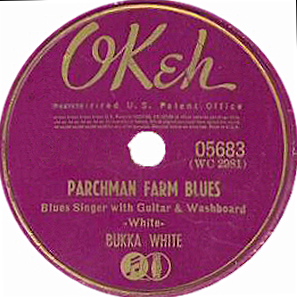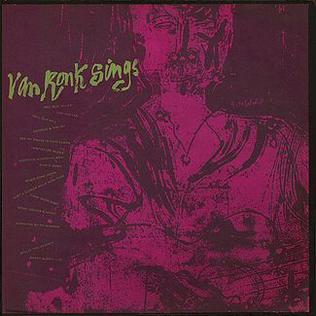
A jug band is a band employing a jug player and a mix of conventional and homemade instruments. These homemade instruments are ordinary objects adapted to or modified for making sound, like the washtub bass, washboard, spoons, bones, stovepipe, jew's harp, and comb and tissue paper. The term 'jug band' is loosely used in referring to ensembles that also incorporate homemade instruments, but that are more accurately called skiffle bands, spasm bands, or juke bands because they do not include a jug player.

Booker T. Washington "Bukka" White was an American Delta blues guitarist and singer.
"Cocaine Blues" is a Western swing song written by Troy Junius Arnall, a reworking of the traditional song "Little Sadie." Roy Hogsed recorded a well known version of the song in 1947.

"In My Time of Dying" is a gospel music song by Blind Willie Johnson. The title line, closing each stanza of the song, refers to a deathbed and was inspired by a passage in the Bible from Psalms 41:3 "The Lord will strengthen him upon the bed of languishing, thou wilt make all his bed in his sickness". Numerous artists have recorded variations, including Bob Dylan and Led Zeppelin.
"He Was a Friend of Mine" is a traditional folk song in which the singer laments the death of a friend. Ethnomusicologist Alan Lomax was the first to collect the song, in 1939, describing it as a "blues" that was "a dirge for a dead comrade."

"Dust My Broom" is a blues song originally recorded as "I Believe I'll Dust My Broom" by American blues artist Robert Johnson in 1936. It is a solo performance in the Delta blues-style with Johnson's vocal accompanied by his acoustic guitar. As with many of his songs, it is based on earlier blues songs, the earliest of which has been identified as "I Believe I'll Make a Change", recorded by the Sparks brothers as "Pinetop and Lindberg" in 1932. Johnson's guitar work features an early use of a boogie rhythm pattern, which is seen as a major innovation, as well as a repeating triplets figure.
"Come Back Baby" is a slow blues song written and recorded by the blues singer and pianist Walter Davis in 1940.

"I-Feel-Like-I'm-Fixin'-to-Die Rag" is a song by the American psychedelic rock band Country Joe and the Fish, written by Country Joe McDonald, and first released as the opening track on the extended play Rag Baby Talking Issue No. 1, in October 1965. "I-Feel-Like-I'm-Fixin'-to-Die Rag"'s dark humor and satire made it one of the most recognized protest songs against the Vietnam War. Critics cite the composition as a classic of the counterculture era.

"Parchman Farm" or "Parchman Farm Blues" is a blues song first recorded by American Delta blues musician Bukka White in 1940. It is an autobiographical piece, in which White sings of his experience at the infamous Mississippi State Penitentiary, otherwise known as Parchman Farm.
"Dink's Song" is an American folk song played by many folk revival musicians such as Pete Seeger, Fred Neil, Bob Dylan and Dave Van Ronk, Kate & Anna McGarrigle, and Cisco Houston as well as more recent musicians like Jeff Buckley. The song tells the story of a woman deserted by her lover when she needs him the most.

Dave Van Ronk, Folksinger is a studio album by American folksinger Dave Van Ronk, released in November 1962 on the Prestige International label.

Van Ronk Sings is an album by American folksinger Dave Van Ronk, released in July 1961.

Hesitation Blues is a compilation album by American folk and blues singer Dave Van Ronk, released in 1988.
"The House of the Rising Sun" is an American traditional folk song, sometimes called "Rising Sun Blues". It tells of a person's life gone wrong in the city of New Orleans. Many versions also urge a sibling or parents and children to avoid the same fate. The most successful commercial version, recorded in 1964 by the British rock band The Animals, was a number one hit on the UK Singles Chart and in the US and Canada. As a traditional folk song recorded by an electric rock band, it has been described as the "first folk rock hit".

"It's Nobody's Fault but Mine" or "Nobody's Fault but Mine" is a song first recorded by gospel blues artist Blind Willie Johnson in 1927. It is a solo performance with Johnson singing and playing slide guitar. The song has been interpreted and recorded by numerous musicians in a variety of styles, including Led Zeppelin on their 1976 album Presence.

The Country Blues is a seminal album released on Folkways Records in 1959, catalogue RF 1. Compiled by Samuel Charters from 78-rpm recordings, it accompanied his book of the same name to provide examples of the music discussed. Both the book and the album were key documents in the American folk music revival of the 1950s and 1960s, and many of its songs would either be incorporated into new compositions by later musicians, or covered outright.

"Shake 'Em On Down" is a Delta blues song by American musician Bukka White. He recorded it in Chicago in September 1937, two months before being incarcerated at the infamous Parchman Prison Farm in Mississippi.

"Bottle Up and Go" or "Bottle It Up and Go" is a song that is a standard of the blues. Based on earlier songs, Delta bluesman Tommy McClennan recorded "Bottle It Up and Go" in 1939. The song has been interpreted and recorded by numerous artists, sometimes using alternate titles, such as "Step It Up and Go", "Shake It Up and Go", etc.
"My Bucket's Got a Hole in It" is a song widely attributed to Clarence Williams, who obtained a copyright in 1933, although the melody was recorded under various names years earlier. The song became popular performed by Hank Williams for MGM and reached number 4 on the country chart in 1949.













